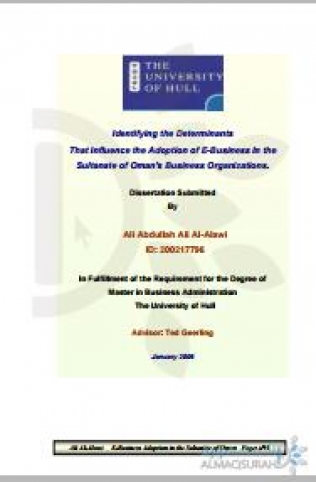
E Business is considered to provide substantial benefits to business organizations specially small and medium size business. This research examine the adoption of e-business in the Sultanate of Oman's business organizations, where the political, social, economic and cultural environment differs markedly from those countries where e-business has already been implemented and tested. Researchers examine various internal and external organization factors in adoption of e-business. These factors examined in Omani organizations using an internet survey for two organizations classes out of five according to the Ministry of Commerce and Industry classification. Overall, the results strongly support the hypothesis, which is consistent with prior studies of Information technology in general and e-business in particular. The research identified eleven internal organization attributes and perceives strategic value of e-business, which was considered by the research participants as essential determinants for the development of an e-business adoption framework. The eleven attributes are financial resources, technological resources, organization structure, culture, top management support, organization readiness, relative advantages, IT security, organization vision, complexity, and compatibility. The research also identifies seven external factors (IT infrastructure, the government support, the industry trend, competition, social, dependency, and awareness) determinants, which are essential for the development of an e-business adoption framework for the Sultanate of Oman organizations. The data was analyzed and a pictorial representation of the e-business adoption framework is provided as the product of this research. A number of conclusions were drawn based on the research results. First, the organizations that have IT resources more likely to adopt e-business than organizations that need to start building technology knowledge and infrastructure required for e-business adoption. Second, adopters and prospectors are more willing to take risks of e-business adoption than laggards since they perceive a more perceptible contribution of e-business, and are more certain on the compatibility of the technology with their organizations. Third, e-business adopters are more likely to operate in a more competitive environment, compared with the other traditional organization types. Fourth, the top management support was found as an important determinant in adopting change in technology and work processes in organizations. The research provided six recommendations for the government and four for the organization to help the Sultanate of Oman's organizations to prepare for the adoption and implementation of e-business initiatives. The recommendations for the government are: awareness program, introduction of e-business into the curriculum, IT infrastructure, e-legislations, and encouragement program. The recommendations for the organization are: establish an independent IT department in the organization, vision, business process reengineering, and merging of companies. The research also shows the limitation and put forward some suggestion for future research.
E Business is considered to provide substantial benefits to business organizations specially small and medium size business. This research examine the adoption of e-business in the Sultanate of Oman's business organizations, where the political, social, economic and cultural environment differs mark...